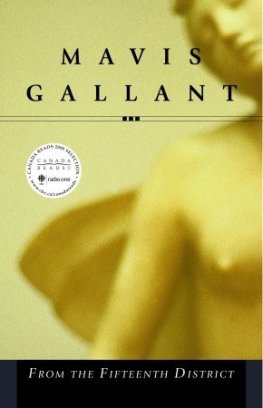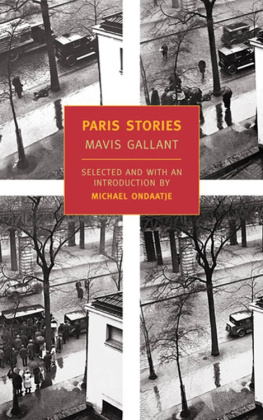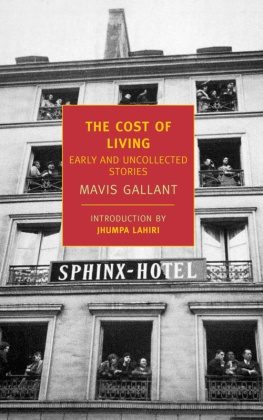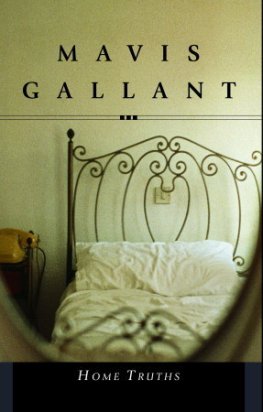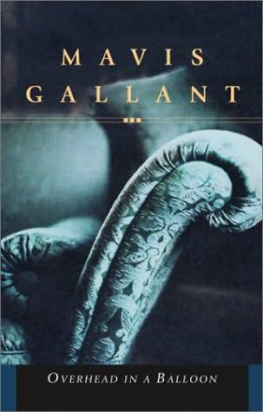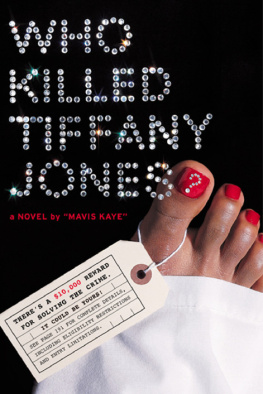Mavis Gallant - Across the Bridge
Here you can read online Mavis Gallant - Across the Bridge full text of the book (entire story) in english for free. Download pdf and epub, get meaning, cover and reviews about this ebook. year: 1994, publisher: McClelland & Stewart, genre: Detective and thriller. Description of the work, (preface) as well as reviews are available. Best literature library LitArk.com created for fans of good reading and offers a wide selection of genres:
Romance novel
Science fiction
Adventure
Detective
Science
History
Home and family
Prose
Art
Politics
Computer
Non-fiction
Religion
Business
Children
Humor
Choose a favorite category and find really read worthwhile books. Enjoy immersion in the world of imagination, feel the emotions of the characters or learn something new for yourself, make an fascinating discovery.

- Book:Across the Bridge
- Author:
- Publisher:McClelland & Stewart
- Genre:
- Year:1994
- Rating:3 / 5
- Favourites:Add to favourites
- Your mark:
- 60
- 1
- 2
- 3
- 4
- 5
Across the Bridge: summary, description and annotation
We offer to read an annotation, description, summary or preface (depends on what the author of the book "Across the Bridge" wrote himself). If you haven't found the necessary information about the book — write in the comments, we will try to find it.
Across the Bridge — read online for free the complete book (whole text) full work
Below is the text of the book, divided by pages. System saving the place of the last page read, allows you to conveniently read the book "Across the Bridge" online for free, without having to search again every time where you left off. Put a bookmark, and you can go to the page where you finished reading at any time.
Font size:
Interval:
Bookmark:

MAVIS GALLANT was born in Montreal in 1922. She spent her childhood years in Quebec, Ontario, and the eastern United States. After completing high school in New York City, she returned to Montreal, where, among other jobs, she worked at the National Film Board. At the age of twenty-one, she became a reporter for the Montreal Standard and stayed with the newspaper for six years. In 1950 she left Canada for Europe, living at various times in Austria, Italy, Spain, and the south of France before settling in Paris.
One of the most acclaimed writers of fiction of our time, Gallant invests the characters of her novels and short stories with a sense of their ambiguous and haunting past, their dilemmas often reflecting more public expressions of postwar anxiety and dislocation. She leavens her vision with a deft irony which reaches at once towards the comic and the tragic.
Gallant is a Companion of the Order of Canada, Fellow of the Royal Society of Literature, and Honorary Foreign Member of the American Academy of Arts and Letters.
Mavis Gallant resides in Paris, France.
General Editor: David Staines
ADVISORY BOARD
Alice Munro
W.H. New
Guy Vanderhaeghe

Copyright 1993 by Mavis Gallant
Afterword copyright 1997 by Pendragon Ink
First published in Canada by McClelland & Stewart Inc. in 1993
New Canadian Library edition 1997
All rights reserved. The use of any part of this publication reproduced, transmitted in any form or by any means, electronic, mechanical, photocopying, recording, or otherwise, or stored in a retrieval system, without the prior written consent of the publisher or, in case of photocopying or other reprographic copying, a licence from the Canadian Copyright Licensing Agency is an infringement of the copyright law.
Library and Archives Canada Cataloguing in Publication
Mavis Gallant, 1922
Across the bridge
(New Canadian library)
eISBN: 978-1-55199-626-4
I. Title.
PS 8513. A 593 A 73 1997 C 813.54 C 96-932094-9
PR 9199.3. G 26 A 64 1997
The events and characters in these stories are fictional. Any resemblance to actual persons or happenings is coincidental.
All stories in this collection have originally appeared in The New Yorker save for 1933, which first appeared in Mademoiselle as Dclass, and The Fenton Child.
The publishers acknowledge the support of the Canada Council and the Ontario Arts Council for their publishing program.
McClelland & Stewart Inc.
75 Sherbourne Street
Toronto, Ontario
M 5 A 2 P 9
v3.1
The following dedication appeared in the original edition:
To
Kitty Crowe
A BOUT A YEAR after the death of M. Carette, his three survivors Berthe and her little sister, Marie, and their mother had to leave the comfortable flat over the furniture store in Rue Saint-Denis and move to a smaller place. They were not destitute: there was the insurance and the money from the sale of the store, but the man who had bought the store from the estate had not yet paid and they had to be careful.
Some of the lamps and end tables and upholstered chairs were sent to relatives, to be returned when the little girls grew up and got married. The rest of their things were carried by two small, bent men to the second floor of a stone house in Rue Cherrier near the Institute for the Deaf and Dumb. The men used an old horse and an open cart for the removal. They told Mme. Carette that they had never worked outside that quarter; they knew only some forty streets of Montreal but knew them thoroughly. On moving day, soft snow, like graying lace, fell. A patched tarpaulin protected the Carettes wine-red sofa with its border of silk fringe, the childrens brass bedstead, their mothers walnut bed with the carved scallop shells, and the round oak table, smaller than the old one, at which they would now eat their meals. Mme. Carette told Berthe that her days of entertaining and cooking for guests were over. She was just twenty-seven.
They waited for the moving men in their new home, in scrubbed, empty rooms. They had already spread sheets of La Presse over the floors, in case the men tracked in snow. The curtains were hung, the cream-colored blinds pulled halfway down the sash windows. Coal had been delivered and was piled in the lean- to shed behind the kitchen. The range and the squat, round heater in the dining room issued tidal waves of dense metallic warmth.
The old place was at no distance. Parc Lafontaine, where the children had often been taken to play, was just along the street. By walking an extra few minutes, Mme. Carette could patronize the same butcher and grocer as before. The same horse-drawn sleighs would bring bread, milk, and coal to the door. Still, the quiet stone houses, the absence of heavy traffic and shops made Rue Cherrier seem like a foreign country.
Change, death, absence the adult mysteries kept the children awake. From their new bedroom they heard the clang of the first streetcar at dawn a thrilling chord, metal on metal, that faded slowly. They would have jumped up and dressed at once, but to their mother this was still the middle of the night. Presently, a new, continuous sound moved in the waking streets, like a murmur of leaves. From the confused rustle broke distinct impressions: an alarm clock, a man speaking, someones radio. Marie wanted to talk and sing. Berthe had to invent stories to keep her quiet. Once she had placed her hand over Maries mouth and been cruelly bitten.
They slept on a horsehair mattress, which had a summer and a winter side, and was turned twice a year. The beautiful stitching at the edge of the sheets and pillows was their mothers work. She had begun to sew her trousseau at the age of eleven; her early life was spent in preparation for a wedding. Above the girls bed hung a gilt crucifix with a withered spray of box hedge that passed for the Easter palms of Jerusalem.
Marie was afraid to go to the bathroom alone after dark. Berthe asked if she expected to see their fathers ghost, but Marie could not say: she did not yet know whether a ghost and the dark meant the same thing. Berthe was obliged to get up at night and accompany her along the passage. The hall light shone out of a blue glass tulip set upon a column painted to look like marble. Berthe could just reach it on tiptoe; Marie not at all.
Marie would have left the bathroom door open for company, but Berthe knew that such intimacy was improper. Although her First Communion was being delayed because Mme. Carette wanted the two sisters to come to the altar together, she had been to practice confession. Unfortunately, she had soon run out of invented sins. Her confessor seemed to think there should be more: he asked if she and her little sister had ever been in a bathroom with the door shut, and warned her of grievous fault.
On their way back to bed, Berthe unhooked a calendar on which was a picture of a family of rabbits riding a toboggan. She pretended to read stories about the rabbits and presently both she and Marie fell asleep.
They never saw their mother wearing a bathrobe. As soon as Mme. Carette got up she dressed herself in clothes that were in the colors of half-mourning mauve, dove-gray. Her fair hair was brushed straight and subdued under a net. She took a brush to everything hair, floors, the childrens elbows, the kitchen chairs. Her scent was of Babys Own soap and Florida Water. When she bent to kiss the children, a cameo dangled from a chain. She trained the girls not to lie, or point, or gobble their food, or show their legs above the knee, or leave fingerprints on windowpanes, or handle the parlor curtains the slightest touch could crease the lace, she said. They learned to say in English, I dont understand and I dont know and No, thank you. That was all the English anyone needed between Rue Saint-Denis and Parc Lafontaine.
Font size:
Interval:
Bookmark:
Similar books «Across the Bridge»
Look at similar books to Across the Bridge. We have selected literature similar in name and meaning in the hope of providing readers with more options to find new, interesting, not yet read works.
Discussion, reviews of the book Across the Bridge and just readers' own opinions. Leave your comments, write what you think about the work, its meaning or the main characters. Specify what exactly you liked and what you didn't like, and why you think so.



